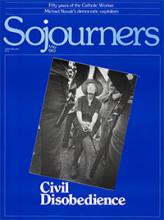Despite the great diversity in the so-called peace churches today, the Mennonites with their 16th-century European anabaptist origins, the Religious Society of Friends, or Quakers (17th-century English origins), and the Church of the Brethren (early 18th-century German roots) do hold to a tradition that is in one sense synonymous with civil disobedience. The peace churches are, by definition, committed to civil disobedience in the matter of conscientious objection to military service. The historical record shows these Christians in many countries disobeying civil laws demanding military conscription.
Being the church, rather than living in the nation, has been the primary source of identity for peace church believers. Living first under the sovereign rule of Jesus Christ, the question for the Christian is not, "May I disobey the civil law?" but rather, "Does the will of Christ permit me to obey the civil law?" The peace church tradition carries a realism about the fallen nature of the state, rooted in the biblical record of God's people suffering repeatedly at the hands of kings and presidents, and the peace churches' own historical experience of the same.
The peace churches emphasize discipleship as obedience to Jesus Christ, defining what it means to be a Christian as a way of living in the present rather than as a mode of thinking about the hereafter. The lordship of Christ has present, not only future, and political, not only spiritual, implications. Romans 13:1, which states, "Be subject to the governing authorities," is held in tension with Matthew 28:18, where Jesus claims, "All authority in heaven and on earth has been given to me." In this matching of unequals, the peace church tradition begins with a presumption in favor of the authority of Jesus.
Read the Full Article

